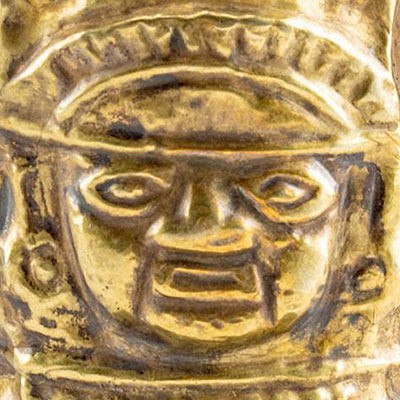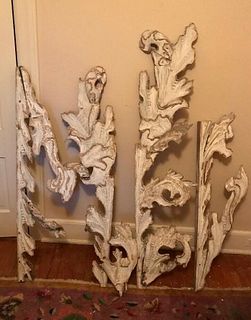Sican Gold Repousse Depiction of Naylamp - 6.4 g
Lot 97
About Seller
Artemis Fine Arts
686 S Taylor Ave, Ste 106
Louisville, CO 80027
United States
Selling antiquities, ancient and ethnographic art online since 1993, Artemis Gallery specializes in Classical Antiquities (Egyptian, Greek, Roman, Near Eastern), Asian, Pre-Columbian, African / Tribal / Oceanographic art. Our extensive inventory includes pottery, stone, metal, wood, glass and textil...Read more
Estimate:
$2,800 - $4,200
Absentee vs Live bid
Two ways to bid:
- Leave a max absentee bid and the platform will bid on your behalf up to your maximum bid during the live auction.
- Bid live during the auction and your bids will be submitted real-time to the auctioneer.
Bid Increments
| Price | Bid Increment |
|---|---|
| $0 | $25 |
| $300 | $50 |
| $1,000 | $100 |
| $2,000 | $250 |
| $5,000 | $500 |
| $10,000 | $1,000 |
| $20,000 | $2,500 |
| $50,000 | $5,000 |
| $100,000 | $10,000 |
| $200,000 | $20,000 |
About Auction
By Artemis Fine Arts
Jan 21, 2021
Set Reminder
2021-01-21 10:00:00
2021-01-21 10:00:00
America/New_York
Bidsquare
Bidsquare : Ancient / Ethnographic From Around The World
https://www.bidsquare.com/auctions/artemis-gallery/ancient-ethnographic-from-around-the-world-6316
Ancient art from Egypt, Greece, Italy and the Near East, as well as Asian, Pre-Columbian, Native American, African / Tribal / Oceanic, Spanish Colonial, Russian Icons, Fine art, much more! All categories, all price ranges... all legally acquired and guaranteed to be as described or your money back. Artemis Fine Arts info@artemisgallery.com
Ancient art from Egypt, Greece, Italy and the Near East, as well as Asian, Pre-Columbian, Native American, African / Tribal / Oceanic, Spanish Colonial, Russian Icons, Fine art, much more! All categories, all price ranges... all legally acquired and guaranteed to be as described or your money back. Artemis Fine Arts info@artemisgallery.com
- Lot Description
Pre-Columbian, North Coast Peru, Sican/Lambayeque, ca. 9th to 11th century CE. A remarkable example of the exceptional luxury arts created by the Sican/Lambayeque peoples, this piece is comprised of 51.43% gold sheet (equivalent to 12K) that has been skillfully cut, hammered, and modeled into an impressive depiction of Naylamp (also Naymlap, Nanlap, or Nylamp), the legendary founder of the Lambayeque dynasty who is believed to have come from the south by sea to colonize the region before allegedly sprouting wings and flying off into the sunset in a dramatic display of his magical powers. The deity's visage presents with bold features - heavily lidded almond-shaped eyes, a fleshy nose, an open mouth, nasolabial folds, and full cheeks - and is bedecked with a grand headdress, earspools, and a beaded pectoral/collar. Precious metal quality: 51.43% gold (equivalent to 12K) and 45.69% silver. Size: 1.4" W x 2.125" H (3.6 cm x 5.4 cm); 4.1" H (10.4 cm) on included custom stand; total weight: 6.4 grams
Sican elites were patrons of workshops that made fine objects made from precious metals like this example. Hammered silver or gold pieces were coveted and created for the tombs of individuals of the highest status. Buried in mounds, these important Sican individuals were certainly entombed in high style.
Provenance: private Hawaii, USA collection; Ex Hirsch collection, Germany, 1950 to 1960
All items legal to buy/sell under U.S. Statute covering cultural patrimony Code 2600, CHAPTER 14, and are guaranteed to be as described or your money back.
A Certificate of Authenticity will accompany all winning bids.
We ship worldwide and handle all shipping in-house for your convenience.
#161533Effigy is removable from display stand. Small areas of damage to peripheries around verso, with light encrustations, slight bending to perforations along upper surfaces, and a few stable hairline fissures along upper and lower peripheries. Great patina throughout and nice preservation to figural details on obverse. Old inventory label beneath bottom of effigy.Condition
- Shipping Info
-
All shipping is handled in-house for your convenience. Your invoice from Artemis Gallery will include shipping calculation instructions. If in doubt, please inquire BEFORE bidding for estimated shipping costs for individual items.
-
- Buyer's Premium



 EUR
EUR CAD
CAD AUD
AUD GBP
GBP MXN
MXN HKD
HKD CNY
CNY MYR
MYR SEK
SEK SGD
SGD CHF
CHF THB
THB














